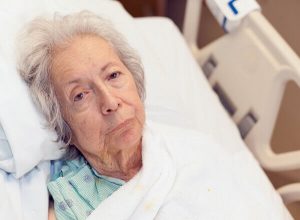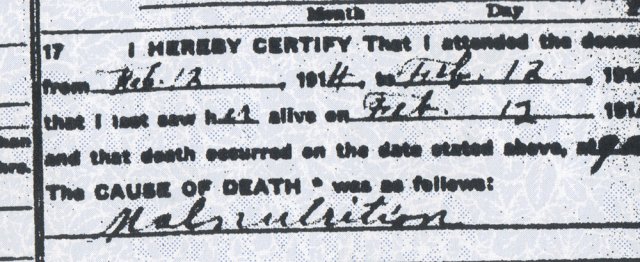Nursing Home Dehydration and Malnutrition Cases
Our narrowly focused nursing home abuse and neglect attorneys regularly pursue justice for families impacted by neglect in nursing homes. At Senior Justice Law Firm, fighting for victims of elder abuse and neglect is all we do. One of the most frequent neglect-related injuries we encounter is dehydration and malnutrition of vulnerable patients.
Our law firm has successfully handled over one thousand nursing home dehydration malnutrition lawsuits. Let our vast experience in this niche practice area help maximize your case.
It is never acceptable to deny a human being water or food. Regulations require that nursing homes and assisted living facilities ensure residents are intaking enough nutrients and hydration. If the resident cannot eat or drink enough on their own, it is the legal responsibility of the nursing home to assist the resident with eating and drinking. Failure to do this can result in severe cases of nursing home malnourishment, or dehydration of elderly nursing home patients.
These injuries can be fatal, and oftentimes result in litigation against the negligent nursing home. Our nursing home dehydration and malnutrition attorneys can assist your family on the journey to justice. Call us today at (888) 375-9998 if your loved one wrongfully passed away due to dehydration or malnutrition in a long term care facility.

Malnutrition and Dehydration of Nursing Home Residents is Preventable
Malnourishment and dehydration have been acknowledged as serious problems within nursing homes for decades. Studies have cited that as many as 85% of nursing home patients suffer from malnourishment, while nearly all patients suffer from some degree of dehydration. This is entirely unacceptable.
Malnourishment and dehydration arise from a deficient diet and liquid intake. Malnourishment and dehydration drastically decrease a patient’s quality of life and increase a patient’s risk of death. Dehydration and malnutrition can result in an emergency hospital visit and even wrongful death. It is the nursing home’s responsibility to ensure that its residents are receiving appropriate nutrition and hydration. If you fear that your loved one was neglected by a nursing home and was injured or killed due to dehydration or malnutrition, call our nursing home abuse lawyers now for your free consultation at 1-888-375-9998.

Signs and Symptoms of Malnourishment in Nursing Home Residents
The most apparent sign of malnourishment is weight loss. However, there are several other signs and symptoms that arise when a patient does not receive the proper diet. These include:
- Prolonged fatigue, sometimes to the point of becoming bedridden
- Rapid weight loss
- Bedsores from becoming bedridden
- Delayed wound healing
- Bloated abdomen
- Thrush within the mouth
- Bleeding and swollen gums
- Urinary Tract Infections
- Swollen corneas
- Inability to keep warm
- Depression and apathy
- Sunken in cheeks with cachexia like appearance

Nursing home negligence lawsuits are oftentimes the only public reprimand a facility faces for causing harm to residents. If your loved one suffered harm under the care of a facility, contact our attorneys today for a free consultation.
Signs and Symptoms of Dehydration
Dehydration is a serious condition that should be corrected as soon as it is suspected. Patients who become dehydrated will experience the following:
- Skin turgor changes
- Cognitive changes
- Nagging thirst
- Dizziness
- Sleepiness
- Dry mouth
- Pale skin that is dry to the touch (no sweating)
- Decreased urine output and urine that is dark
- Rapid breathing
- Low blood pressure
- Confusion and irritability

Causes for Malnourishment and Dehydration:
Nursing Home Neglect
Malnourishment and dehydration can be caused by a patient’s underlying conditions as well as the medications they take. Patients who suffer from the conditions listed below commonly experience difficulties with eating or drinking. In addition, certain medications are known to cause nausea or loss of appetite.
- Depression
- Cognitive impairment such as dementia or Alzheimer’s
- Difficulty swallowing (dysphagia) due to stroke, Parkinson’s, or other diseases
- Tooth decay or other problems with oral health such as ill-fitting dentures
- Diarrhea
It is important to note that all of the health conditions listed above can be properly treated without causing malnourishment or dehydration. Of course, doing so requires close monitoring and support from nursing home staff. The importance of closely monitoring and supporting individual patients leads us to analyze the issues of inadequate staffing and training of nursing assistants.
Malnourishment and dehydration are typically caused by issues with the nursing home and its management. These issues include inadequate staffing and a lack of qualified, caring nursing assistants (CNAs). Inadequate staffing at nursing homes causes malnourishment and dehydration because it limits a caretaker’s ability to assist patients with eating and drinking. Ideally, a single caretaker tends to two to three patients at mealtimes. However, studies have shown that inadequate staffing at nursing homes can lead to as many as fifteen patients being assigned to one caretaker. Not only are caretakers assigned too many patients, but they usually do not have adequate training or knowledge of their patients’ dietary needs. This leads to a lack of individualized caretaker attention, and the most vulnerable residents who need assistance with eating and drinking are often unable to get the nutrition they so desperately need.

Concerns for Dehydration & Malnourished Nursing Home Residents

The majority of patients in nursing homes need help to eat and drink. For example, 60% – 70% of patients suffer from some sort of cognitive impairment that prevents them from feeding themselves. 40% – 60% of patients suffer from dysphagia, or difficulty swallowing. All of these patients require a caretaker to assist them during mealtimes. Even patients who are able to feed themselves require a caretaker to monitor their intake and make sure the resident is not choking on their food.
Staff must constantly supervise and assess each patient’s dietary intake. Patients that become malnourished or dehydrated are less able to fight off infection or recover from illnesses. This is a serious problem for elderly patients, whose immune systems and overall health are already compromised by advanced age and underlying medical conditions. It is vital that the staff at nursing homes remain vigilant of the signs and symptoms of malnourishment and dehydration.

Nursing Home Abuse Lawsuits Regarding Malnourishment and Dehydration
Nursing homes are required by law to meet their patient’s nutrition and hydration needs. Only two situations can legally prevent a nursing home from providing proper nutrition and hydration: a terminal disease process (such as terminal cancer) or the patient’s refusal to eat/drink. If a patient refuses to eat or drink, medical professionals are still obligated to determine and deal with the reason for the patient’s refusal. Alternatives must be offered. A nursing home is not legally permitted to allow a patient to starve to death.
For example, a patient may refuse to eat or drink because of depression or religious beliefs. This could be rectified with the use of antidepressants or by offering more menu options. Two cases in which a nursing home was found liable for a patient’s malnutrition and subsequent death are described below.
In the first case, an elderly female patient was prescribed a medication that caused her to lose her appetite. The patient stopped eating and drinking, causing her to become weak and lethargic. She was eventually admitted to a hospital where she died of malnutrition and dehydration. In this dehydration wrongful death case, staff at the nursing home failed to observe the patient’s uneaten food or recognize her deteriorating symptoms. They failed to properly monitor her condition and continued to prescribe her the same medication. Her subsequent death was attributed to the neglect of the nursing home.
In the second case, an elderly man was admitted into a nursing home. After only 63 days, the man died of malnutrition and complications from untreated bedsores. Investigations showed that the patient had lost over 30 pounds during his short term at the nursing home. In this case, staff at the nursing home failed to observe the patients drastic weight loss and take corrective measures. His subsequent death was attributed to the neglect of the nursing home.
Contact Us for a Free Consultation
Have a loved one that suffered malnourishment or dehydration under the care of a nursing home or assisted living facility? They deserve justice. Contact our law firm today for a free consultation.
Dehydration & Malnutrition Nursing Home Lawsuit: Free Consultation
Malnourishment and dehydration are common problems for nursing home patients. Nonetheless, medical staff and personnel are obligated to do everything in their power to mitigate and resolve cases of severe thirst and malnutrition.
Just because nursing home dehydration cases are common does not mean they are acceptable. If you feel that a loved one’s deterioration was caused by malnourishment or dehydration, take action today.
A nursing home is legally required to make sure a resident is eating and drinking. Failure to do so is nursing home negligence. At Senior Justice Law Firm, nursing home neglect cases are all that we do. Almost half of our cases involve allegations of dehydration or improper food.
Our nursing home abuse law firm is here to help you and your family. Call for your free consultation now at 1-888-375-9998.



